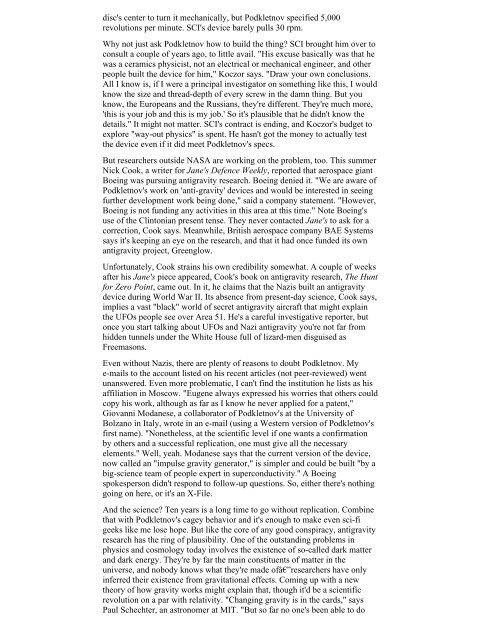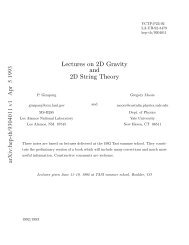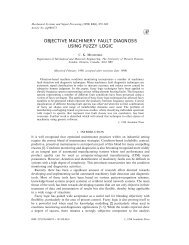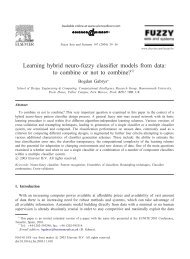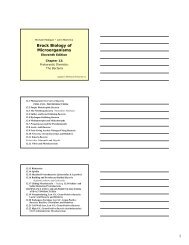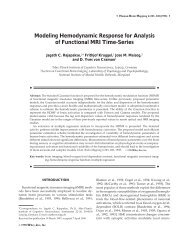- Page 1 and 2:
Gravitational Shielding Research Th
- Page 3 and 4:
Search - Finance Home - Yahoo! - He
- Page 5 and 6:
NEWS SPORT WEATHER WORLD SERVICE A-
- Page 7 and 8:
CATEGORIES TV RADIO COMMUNICATE WHE
- Page 9 and 10:
low graphics version | feedback | h
- Page 11 and 12:
low graphics version | feedback | h
- Page 13 and 14:
Front Page UK World Business Sci/Te
- Page 15 and 16:
CATEGORIES TV RADIO COMMUNICATE WHE
- Page 17 and 18:
Front Page World UK UK Politics Bus
- Page 19 and 20:
Log In Log Out Help Feedback My Acc
- Page 21:
were detailed in JDW 24 July. "Ther
- Page 25 and 26:
By treating the triangular shape as
- Page 27 and 28:
produce a levitation effect. This t
- Page 29:
The Cook Inertial Propulsion unit b
- Page 38:
Lending possible credence to that a
- Page 41 and 42:
Yet, even VentureStar, which if
- Page 43 and 44:
eally only touching on the make or
- Page 50 and 51:
Log In Log Out Help Feedback My Acc
- Page 52 and 53:
hypersonic aerodynamics, particular
- Page 54 and 55:
Recent revelations that BAe is esta
- Page 62 and 63:
Log In Log Out Help Feedback My Acc
- Page 64 and 65:
In 2010: Odyssey II, published in 1
- Page 66 and 67:
technology, fibre optics, tactical
- Page 68 and 69:
Drawing: Los Alamos free electron l
- Page 70 and 71:
Lending possible credence to that a
- Page 72 and 73:
fundamental laws of physics. "The t
- Page 74 and 75:
that had little relationship to the
- Page 76 and 77:
(c)2002 American Institute of Aeron
- Page 78 and 79:
(c)2002 American Institute of Aeron
- Page 80 and 81:
(c)2002 American Institute of Aeron
- Page 82 and 83:
(c)2002 American Institute of Aeron
- Page 84 and 85:
Copyright© 1997, American Institut
- Page 86 and 87:
Copyright© 1997, American Institut
- Page 88 and 89:
Copyright© 1997, American Institut
- Page 90 and 91:
Copyright© 1997, American Institut
- Page 92 and 93:
was highly questioned Copyright© 1
- Page 94 and 95:
Copyright© 1997, American Institut
- Page 96 and 97:
c)2001 American Institute
- Page 98 and 99:
c)2001 American Institute
- Page 100 and 101:
c)2001 American Institute of Aerona
- Page 102 and 103:
EXPLORATION OF ANOMALOUS GRAVITY EF
- Page 104 and 105:
As aerospace engineers we deal more
- Page 106 and 107:
( DxB) ∂ fH = , (2) ∂t where D
- Page 108 and 109:
d φ = KG (8) c dM The sensitivity
- Page 110 and 111:
- axis) of each chart refers to the
- Page 112 and 113:
non-EM modulated tests on the masse
- Page 114 and 115:
(c)2001 American Institute of Aeron
- Page 116 and 117:
(c)2001 American Institute of Aeron
- Page 118 and 119:
(c)2001 American Institute of Aeron
- Page 120 and 121:
(c)2001 American Institute of Aeron
- Page 122 and 123:
(c)2001 American Institute of Aeron
- Page 124 and 125:
(c)2001 American Institute of Aeron
- Page 126 and 127:
(c)2001 American Institute of Aeron
- Page 128 and 129:
(c)2001 American Institute of Aeron
- Page 130 and 131:
(c)2001 American Institute of Aeron
- Page 132 and 133:
(c)2001 American Institute of Aeron
- Page 134 and 135:
(c)2001 American Institute of Aeron
- Page 136 and 137:
c)2001 American Institute of Aerona
- Page 138 and 139:
c)2001 American Institute
- Page 140 and 141:
c)2001 American Institute
- Page 142 and 143:
c)2001 American Institute of Aerona
- Page 144 and 145:
c)2001 American Institute
- Page 146 and 147:
c)2001 American Institute
- Page 148 and 149:
c)2001 American Institute of Aerona
- Page 150 and 151:
c)2001 American Institute
- Page 152 and 153:
c)2001 American Institute
- Page 154 and 155:
c)2001 American Institute
- Page 156 and 157:
c)2001 American Institute of Aerona
- Page 158 and 159:
c)2001 American Institute
- Page 160 and 161:
c)2001 American Institute
- Page 162 and 163:
c)2001 American Institute
- Page 164 and 165:
c)2001 American Institute
- Page 166 and 167:
c)2001 American Institute
- Page 168 and 169:
c)2001 American Institute
- Page 170 and 171:
c)2001 American Institute
- Page 172 and 173:
c)2001 American Institute
- Page 174 and 175:
c)2001 American Institute of Aerona
- Page 176 and 177:
c)2001 American Institute
- Page 178 and 179:
c)2001 American Institute
- Page 180 and 181:
c)2001 American Institute
- Page 182 and 183:
c)2001 American Institute
- Page 184 and 185:
c)2001 American Institute of Aerona
- Page 186 and 187:
c)2001 American Institute
- Page 188 and 189:
c)2001 American Institute of Aerona
- Page 190 and 191:
c)2001 American Institute of Aerona
- Page 192 and 193:
c)2001 American Institute
- Page 194 and 195:
(c)2001 American Institute of Aeron
- Page 196 and 197:
(c)2001 American Institute of Aeron
- Page 198 and 199:
(c)2001 American Institute of Aeron
- Page 200 and 201:
(c)2001 American Institute of Aeron
- Page 202 and 203:
(c)2001 American Institute of Aeron
- Page 204 and 205:
(c)2001 American Institute of Aeron
- Page 206 and 207:
(c)2001 American Institute
- Page 208 and 209:
(c)2001 American Institute of Aeron
- Page 210 and 211:
(c)2001 American Institute of Aeron
- Page 212 and 213:
(c)2001 American Institute of Aeron
- Page 214 and 215:
(c)2001 American Institute
- Page 216 and 217:
(c)2001 American Institute
- Page 218 and 219:
(c)2001 American Institute of Aeron
- Page 220 and 221:
(c)2001 American Institute of Aeron
- Page 222 and 223:
(c)2001 American Institute of Aeron
- Page 224 and 225:
(c)2001 American Institute of Aeron
- Page 226 and 227:
(c)2001 American Institute of Aeron
- Page 228 and 229:
(c)2001 American Institute of Aeron
- Page 230 and 231:
(c)2001 American Institute of Aeron
- Page 232 and 233:
(c)2001 American Institute
- Page 234 and 235:
(c)2001 American Institute of Aeron
- Page 236 and 237:
(c)2001 American Institute
- Page 238 and 239:
(c)2001 American Institute of Aeron
- Page 240 and 241:
(c)l999 American Institute of Aeron
- Page 242 and 243:
(c)l999 American Institute of Aeron
- Page 244 and 245:
(c)l999 American Institute of Aeron
- Page 246 and 247:
(c)l999 American Institute of Aeron
- Page 248 and 249:
(c)l999 American Institute of Aeron
- Page 250 and 251:
(c)l999 American Institute of Aeron
- Page 252 and 253:
(c)l999 American Institute of Aeron
- Page 254 and 255:
BREAKTHROUGH PROPULSION PHYSICS RES
- Page 256 and 257:
PROGRAM PRIORITIES To simultaneousl
- Page 258 and 259:
STATUS AND DIRECTION A government s
- Page 260 and 261:
REPORT DOCUMENTATION PAGE Public re
- Page 262 and 263:
Recent calculations have indicated
- Page 264 and 265:
Casimir force has only been compute
- Page 266 and 267:
Cavity width 125 nm Cavity wall 245
- Page 268 and 269:
Also shown for comparison, is the c
- Page 270 and 271:
AIAA-2001-3906 SEARCH FOR EFFECTS O
- Page 272 and 273:
AIAA-2001-3906 Experiment 2 - Time-
- Page 274 and 275:
AIAA-2001-3906 Resonance - 0 flow R
- Page 276 and 277:
AIAA-2001-3906 Einstein Rocket -- E
- Page 278 and 279:
Tests of Mach's Principle with a Me
- Page 280 and 281:
we note that Woodward [4] has made
- Page 282 and 283:
and their tensioning mechanism. Ele
- Page 284 and 285:
Conclusion The test of Mach’s pri
- Page 286 and 287:
velocity of the “front” that mu
- Page 288 and 289:
Fortunately, recent advances in non
- Page 290 and 291:
The time difference between two wel
- Page 292 and 293:
impinging at normal incident on a m
- Page 294 and 295:
sooner than his challenger. Interes
- Page 296 and 297:
(c)2001 American Institute of Aeron
- Page 298 and 299:
(c)2001 American Institute of Aeron
- Page 300 and 301:
(c)2001 American Institute of Aeron
- Page 302 and 303:
(c)2001 American Institute of Aeron
- Page 304 and 305:
(c)2001 American Institute of Aeron
- Page 306 and 307:
Register or Login: Password: Quick
- Page 308 and 309:
non-empty space¯time with a horizo
- Page 310 and 311:
metric of S-1 takes the form ds 2 =
- Page 312 and 313:
L. Hui Astrophys. J. 519 (1999), p.
- Page 314 and 315:
Register or Login: Password: Quick
- Page 316 and 317:
consistent with the boundary condit
- Page 318 and 319:
classical behaviour is recovered fo
- Page 320 and 321:
Heisenberg's equations for the posi
- Page 322 and 323:
(2K) Fig. 1. Behaviour of Q(t) for
- Page 324 and 325:
5. N.A. Lemos J. Math. Phys. 37 (19
- Page 326 and 327:
arXiv:cond-mat/9701074 v3 16 Sep 19
- Page 328 and 329:
technology involved in the construc
- Page 330 and 331:
3 Operation of the apparatus. Two i
- Page 332 and 333:
following: in a field gradient of 0
- Page 334 and 335:
inner edge of the toroid (5-7 mm fr
- Page 336 and 337:
7 Discussion. The interaction of a
- Page 338 and 339:
8.1 Acknowledgments. The author is
- Page 340 and 341:
High T c materials, fabrication |ge
- Page 342 and 343:
Supporting solenoids |general, fig.
- Page 344 and 345:
Rotating solenoids |general, fig. 3
- Page 346 and 347:
Cryogenic system |general, fig. 51/
- Page 348 and 349:
Disk braking system |general, fig.
- Page 350 and 351:
In two recent experiments [1, 2], P
- Page 352 and 353:
true, must then consist of some kin
- Page 354 and 355:
constant turns Eintein gravity into
- Page 356 and 357:
[2] E. Podkletnov and A.D. Levit, G
- Page 358 and 359:
Proposal for the Experimental Detec
- Page 360 and 361:
Non-detection of the effect would a
- Page 362 and 363:
system of units to another rather t
- Page 364 and 365:
is not SC, and is composed of norma
- Page 366 and 367:
the rest of the SC). This would sho
- Page 368 and 369:
cylinder has its long axis oriented
- Page 370 and 371:
(24) s = Iω where ω is the spin a
- Page 372 and 373:
established. For ease of experiment
- Page 374 and 375:
lowered into the chamber, alternati
- Page 376 and 377:
T < Tc n n T > Tc n 0 Table 1: Inte
- Page 378 and 379:
a gravitational BCS type theory is
- Page 380 and 381:
III Gravitational London Equations
- Page 382 and 383:
VI Conclusion More significant than
- Page 384 and 385:
UTF-367/96 Jan 1996 arXiv:supr-con/
- Page 386 and 387:
case). To sketch our model - althou
- Page 388 and 389:
The constants k and λ are related
- Page 390 and 391:
UTF-368/96 Jan 1996 Role of a ”Lo
- Page 392 and 393:
mention its scale behaviour and two
- Page 394 and 395:
average out. If µ denotes the ener
- Page 396 and 397:
We expect that when the Montecarlo
- Page 398 and 399:
interact between themselves and pos
- Page 400 and 401:
the system can be expressed as E =
- Page 402 and 403:
〈( ∑ i ( ∑ i = s ij1 ) 2 +
- Page 404 and 405:
as due to the periodic boundary con
- Page 406 and 407:
[1] M.J.G. Veltman, in Methods in f
- Page 408 and 409:
J. Phys.: Condens. Matter 8 (1996)
- Page 410 and 411:
Letter to the Editor L447 Figure 2.
- Page 412 and 413:
Letter to the Editor L449 Figure 3.
- Page 414 and 415:
Letter to the Editor L451 Figure 4.
- Page 416 and 417:
Letter to the Editor L453 Kato R, E
- Page 418 and 419:
The behavior of a Bose condensate -
- Page 420 and 421:
indices of the field must be effect
- Page 422 and 423:
purely gravitational cosmological t
- Page 424 and 425:
(Note that for solutions of (12) on
- Page 426 and 427:
effects can arise. Both characteris
- Page 428 and 429:
density, there will be a thin layer
- Page 430 and 431:
“Mettler 300” scale (300 g full
- Page 432 and 433:
any work on it and thus does not fe
- Page 434 and 435:
[13] H.W. Hamber and R.M. Williams,
- Page 436 and 437:
Appendix: earlier setup. Our first
- Page 438 and 439:
FIGURE CAPTIONS 1. Typical double-w
- Page 440 and 441:
6. Detection system for the demonst
- Page 442 and 443:
Engineering Analysis of the Podklet
- Page 444 and 445:
Magnetic Flux Lines around 1/2 of t
- Page 446 and 447:
From a Relativistic Phenomenology o
- Page 448 and 449:
1. Introduction In this paper we pr
- Page 450 and 451:
(Rubin 1993). In fact, throughout t
- Page 452 and 453:
Lastly, if we consider a theory of
- Page 454 and 455:
3. The Lie conformal pseudogroup as
- Page 456 and 457:
ρ s σ(X, Y ) = ρ ic (X, Y ) −
- Page 458 and 459:
and ˆf ˆρ = ˆρ. (17) In the la
- Page 460 and 461:
Thus, at the sheafs level, the non-
- Page 462 and 463:
that µ may be considered as an Abr
- Page 464 and 465:
Definition 2 We define the r-th Spe
- Page 466 and 467:
Finally, we also have [D 1 , D 2 ]
- Page 468 and 469:
4. The potentials of interaction an
- Page 470 and 471:
where i Y is the interior product b
- Page 472 and 473:
such as ∀ξ k+1 , η k+1 ∈ J k+
- Page 474 and 475:
5.2. The gravitational and electrom
- Page 476 and 477:
This might be (?) an illustration o
- Page 478 and 479:
One uses a rather classical method
- Page 480 and 481:
⎧ ⎪⎨ φ µ (α) = − 1 µ,k
- Page 482 and 483:
ther their real parts, nor their im
- Page 484 and 485:
evolution. In some ways as G. Deleu
- Page 486 and 487:
Pommaret, J.-F. 1995 Suites Differe
- Page 488 and 489:
2 Introduction The discovery of sup
- Page 490 and 491:
4 depressed by a magnetic field [12
- Page 492 and 493:
6 symmetry for the cuprates. Surpri
- Page 494 and 495:
8 metallic ρ(Τ) α T n with n > 1
- Page 496 and 497:
10 pseudogap, two dimensional (2D)
- Page 498 and 499:
12 the hole-doped and electron-dope
- Page 500 and 501:
14 An example of recent progress in
- Page 502 and 503:
16 crystals of these materials [104
- Page 504 and 505:
18 Acknowledgments Assistance in pr
- Page 506 and 507:
20 [22] M. T. Béal-Monod and K. Ma
- Page 508 and 509:
22 [59] A. V. Puchkov, P. Fournier,
- Page 510 and 511:
24 [94] A. G. Sun, A. Truscott, A.
- Page 512 and 513:
26 Table caption Table 1. (a) Some
- Page 514 and 515:
28 Fig. 8. Schematic phase diagram
- Page 516:
30 Table 1. (a) Some important clas
- Page 532 and 533:
wave (7). A background discussion o
- Page 534 and 535:
Gravitation shielding properties of
- Page 536 and 537:
A combination of two different crys
- Page 538 and 539:
3 records selected from Compendex f
- Page 540 and 541:
8. Accession Number: 4 Title:Anti-g
- Page 542 and 543:
Language: English. Document type: J
- Page 544 and 545:
4. Accession Number: 1924832 Title:
- Page 546 and 547:
6. Accession Number: 1171584 Title:
- Page 548 and 549:
4 records selected from Compendex f
- Page 550 and 551:
Full Text Options Access Electronic
- Page 552 and 553:
Take your sex life places it’s ne
- Page 554 and 555:
Pitt physicist offers spin on a uni
- Page 556 and 557:
and his son suffered from mental il
- Page 558 and 559:
that doesn't necessarily mean it do
- Page 560:
But science is constantly doing thi
- Page 566 and 567:
M. Agop et al. / Physica C 339 (200
- Page 568 and 569:
M. Agop et al. / Physica C 339 (200
- Page 570 and 571:
the gravitational ®eld by means of
- Page 572 and 573:
M. Agop et al. / Physica C 339 (200
- Page 579 and 580:
ScienceDirect - Technol Rep Tohoku
- Page 581 and 582:
New Scientist The World's No.1 Scie
- Page 583 and 584:
New Scientist The World's No.1 Scie
- Page 585 and 586:
New Scientist---Antigravity *See up
- Page 587 and 588:
unaffected by an inch-thick steel p
- Page 589 and 590:
Polarizable-Vacuum (PV) representat
- Page 591 and 592:
A. Velocity of Light in a Vacuum of
- Page 593 and 594:
From the reciprocal of Eq. (10) we
- Page 595 and 596:
III. CLASSICAL EXPERIMENTAL TESTS O
- Page 597 and 598:
⎡ v L ≈ c ⎢ 1 − 2GM 1 ⎣
- Page 599 and 600:
d 2 u dθ + u = GMm 2 O e 2GMu c2 +
- Page 601 and 602:
IV. COUPLED MATTER-FIELD EQUATIONS
- Page 603 and 604:
B. General Matter-Field Equations
- Page 605 and 606:
or 2 GM rc 2 K = e = GM rc 2 K = e
- Page 607 and 608:
Comparison of Eqns. (70) - (71) wit
- Page 609 and 610:
Table Metric Effects in the Polariz
- Page 611:
16. H. Goldstein, Classical Mechani
- Page 614 and 615:
Tony Robertson, Staff Engineer for
- Page 616 and 617:
compensation, but with mandatory in
- Page 618 and 619: Uncontrolled terms: Thermomagnetoel
- Page 620 and 621: Compilation and Indexing Terms, ©2
- Page 622 and 623: Дата 20020805 Дата загр
- Page 624 and 625: устройстве мира - д
- Page 626 and 627: ------------- [http://news.bbc.co.u
- Page 628 and 629: уважаемых академик
- Page 630 and 631: сильнейшую головну
- Page 632 and 633: Именно так воздейс
- Page 634 and 635: Ученые предложили
- Page 636 and 637: С самим ученым нам
- Page 638 and 639: Американское Нацио
- Page 640 and 641: а на горизонте приз
- Page 642 and 643: Андрей Самохин В по
- Page 644 and 645: Мы празднуем своео
- Page 646 and 647: Мультимедийный вар
- Page 648 and 649: Но, видя сильный ве
- Page 650 and 651: Сейчас Поляков дав
- Page 652 and 653: антигравитационны
- Page 654 and 655: не отрубил. Обидно:
- Page 656 and 657: Национальное аэрок
- Page 658 and 659: долларов. Наверное,
- Page 660 and 661: последний номер с в
- Page 662 and 663: "И вдруг, когда молн
- Page 664 and 665: них магнитный моме
- Page 666 and 667: Успех эксперимента
- Page 670 and 671: etter than Einstein." Still, Einste
- Page 672 and 673: The U.S. Antigravity Squadron That
- Page 674 and 675: Emerging Possibilities for Space Pr
- Page 676 and 677: Emerging Possibilities for Space Pr
- Page 678 and 679: Emerging Possibilities for Space Pr
- Page 680 and 681: Annotated Bibliography (September-O
- Page 682 and 683: Annotated Bibliography as the "infl
- Page 684 and 685: Annotated Bibliography In Acta Astr
- Page 686 and 687: Operation LUSTY near- obsessive bel
- Page 688 and 689: Operation LUSTY accomplished the ba
- Page 690 and 691: Operation LUSTY penetrate enemy ter
- Page 692 and 693: Operation LUSTY his successor, that
- Page 694 and 695: Operation LUSTY desired effects aga
- Page 696 and 697: Operation LUSTY 23. Dr. Homerjoe St
- Page 698 and 699: RS Electrogravitic References RS El
- Page 700 and 701: RS Electrogravitic References Of al
- Page 702 and 703: RS Electrogravitic References obser
- Page 704 and 705: RS Electrogravitic References time
- Page 706 and 707: RS Electrogravitic References HEP-T
- Page 708 and 709: RS Electrogravitic References an ar
- Page 710 and 711: RS Electrogravitic References The R
- Page 712 and 713: RS Electrogravitic References In: P
- Page 714 and 715: RS Electrogravitic References . San
- Page 716 and 717: RS Electrogravitic References 2.3 D
- Page 718 and 719:
RS Electrogravitic References -- Ri
- Page 720 and 721:
RS Electrogravitic References from
- Page 722 and 723:
RS Electrogravitic References and G
- Page 724 and 725:
RS Electrogravitic References From:
- Page 726 and 727:
RS Electrogravitic References scien
- Page 728 and 729:
RS Electrogravitic References the a
- Page 730 and 731:
RS Electrogravitic References MAGNE
- Page 732 and 733:
RS Electrogravitic References AUTHO
- Page 734 and 735:
RS Electrogravitic References F: We
- Page 736 and 737:
RS Electrogravitic References "Grav
- Page 738 and 739:
RS Electrogravitic References Congr
- Page 740 and 741:
RS Electrogravitic References Revol
- Page 742 and 743:
RS Electrogravitic References Autho
- Page 744 and 745:
RS Electrogravitic References b. Ci
- Page 746 and 747:
RS Electrogravitic References Znida
- Page 748 and 749:
RS Electrogravitic References force
- Page 750 and 751:
RS Electrogravitic References Kidd,
- Page 752 and 753:
RS Electrogravitic References Galli
- Page 754 and 755:
RS Electrogravitic References COPYR
- Page 756 and 757:
RS Electrogravitic References Title
- Page 758 and 759:
RS Electrogravitic References impre
- Page 760 and 761:
RS Electrogravitic References and,
- Page 762 and 763:
RS Electrogravitic References GENER
- Page 764 and 765:
RS Electrogravitic References acces
- Page 766 and 767:
RS Electrogravitic References altho
- Page 768 and 769:
RS Electrogravitic References appea
- Page 770 and 771:
RS Electrogravitic References withi
- Page 772 and 773:
RS Electrogravitic References follo
- Page 774 and 775:
RS Electrogravitic References Antim
- Page 776 and 777:
RS Electrogravitic References conve
- Page 778 and 779:
RS Electrogravitic References -----
- Page 780 and 781:
RS Electrogravitic References -----
- Page 782 and 783:
RS Electrogravitic References AUTHO
- Page 784 and 785:
RS Electrogravitic References In: P
- Page 786 and 787:
RS Electrogravitic References suppr
- Page 788 and 789:
RS Electrogravitic References mater
- Page 790 and 791:
RS Electrogravitic References AUTHO
- Page 792 and 793:
RS Electrogravitic References TITLE
- Page 794 and 795:
RS Electrogravitic References R. H.
- Page 796 and 797:
RS Electrogravitic References M. Ku
- Page 798 and 799:
RS Electrogravitic References of th
- Page 800 and 801:
RS Electrogravitic References FORMA
- Page 802 and 803:
RS Electrogravitic References Lette
- Page 804 and 805:
RS Electrogravitic References Dirty
- Page 806 and 807:
RS Electrogravitic References AUTHO
- Page 808 and 809:
Electrogravitics Systems: An examin
- Page 810 and 811:
Electrogravitics Systems: An examin
- Page 812 and 813:
Electrogravitics Systems: An examin
- Page 814 and 815:
Electrogravitics Systems: An examin
- Page 816 and 817:
Electrogravitics Systems: An examin
- Page 818 and 819:
Electrogravitics Systems: An examin
- Page 820 and 821:
Electrogravitics Systems: An examin
- Page 822 and 823:
Electrogravitics Systems: An examin
- Page 824 and 825:
Electrogravitics Systems: An examin
- Page 826 and 827:
Electrogravitics Systems: An examin
- Page 828 and 829:
Electrogravitics Systems: An examin
- Page 830 and 831:
Electrogravitics Systems: An examin
- Page 832 and 833:
Electrogravitics Systems: An examin
- Page 834 and 835:
Electrogravitics Systems: An examin
- Page 836 and 837:
Electrogravitics Systems: An examin
- Page 838 and 839:
Electrogravitics Systems: An examin
- Page 840 and 841:
Electrogravitics Systems: An examin
- Page 842 and 843:
Electrogravitics Systems: An examin
- Page 844 and 845:
Electrogravitics Systems: An examin
- Page 846 and 847:
Electrogravitics Systems: An examin
- Page 848 and 849:
Electrogravitics Systems: An examin
- Page 850 and 851:
ELECTROGRAVITICS SYSTEMS REPORTS ON
- Page 852 and 853:
CONTENTS Foreword 4 Elizabeth Rausc
- Page 854 and 855:
Accelerator Center, Stanford, CA wi
- Page 856:
Introduction, as well as copies of
- Page 861 and 862:
ELECTROGRAVITICS SYSTEMS An examina
- Page 863 and 864:
DISCUSSION Electrogravitics might b
- Page 865 and 866:
particles - that is to say those th
- Page 867 and 868:
interrelationship is a difficulty a
- Page 869 and 870:
electrogravitics. This is one line
- Page 871 and 872:
In 1955 the number of technicians e
- Page 873 and 874:
existence and collisions that give
- Page 875 and 876:
and counterbary. Counterbary is the
- Page 877 and 878:
ANTI-GRAVITATION RESEARCH The basic
- Page 879 and 880:
towards realization of a manned veh
- Page 881 and 882:
ELECTRO-GRAVITIC PROPULSION SITUATI
- Page 883 and 884:
investment is likely to be necessar
- Page 885 and 886:
to its present pitch. Beyond the th
- Page 887 and 888:
ELECTRO-GRAVITICS EFFORT WIDENING C
- Page 889 and 890:
ELECTROSTATIC MOTORS 40
- Page 891 and 892:
THE GRAVITICS SITUATION December 19
- Page 893 and 894:
that no new breakthroughs are neede
- Page 895 and 896:
equipotentials can be made less con
- Page 897 and 898:
laboratory man-hours is necessary o
- Page 899 and 900:
But aviation business is understand
- Page 901 and 902:
HI i GLOSSARY Gravithermals: Thermi
- Page 903 and 904:
Magnetogravitics : Boson Fields: Fe
- Page 905 and 906:
N. Schein, D.M. Haskin and R.G. Cla
- Page 907 and 908:
similar and allied forces the two e
- Page 909 and 910:
This movement is practically linear
- Page 911 and 912:
an assembly of the gravitator cells
- Page 913 and 914:
space were suddenly filled with man
- Page 915 and 916:
and utilizing it in the constructio
- Page 917 and 918:
APPENDIX ffl GRAVITY EFFECTS The or
- Page 919 and 920:
APPENDIX IV A LINK BETWEEN GRAVITAT
- Page 921 and 922:
APPENDIX VI WEIGHT-MASS ANOMALY The
- Page 923 and 924:
ABSTRACT Based on the asymmetry of
- Page 925 and 926:
do not favor such transitions, and
- Page 927 and 928:
THE U.S. ANTIGRAVITY SQUADRON by Pa
- Page 929 and 930:
Clearly, the overseers of black R &
- Page 931 and 932:
The saucers made by Brown have no p
- Page 933 and 934:
supersonic velocities. Also, in his
- Page 935 and 936:
Figure 5. A version of the flying d
- Page 937 and 938:
dielectrics are a likely choice for
- Page 939 and 940:
Figure 7. A side view of the B-2 sh
- Page 941 and 942:
which provides the electrostatic en
- Page 943 and 944:
for linearly accelerating negative
- Page 945 and 946:
Unit, London, February 1956. (Libra
- Page 949 and 950:
100
- Page 951 and 952:
102
- Page 953 and 954:
104
- Page 955 and 956:
106
- Page 957 and 958:
108
- Page 959 and 960:
110
- Page 961 and 962:
112
- Page 963 and 964:
Larry Deavenport is a hobbyist in e
- Page 965 and 966:
various levels and special notice w
- Page 967 and 968:
The Antigravity Research of T. Town
- Page 970 and 971:
Book Review Electrogravitics System
- Page 972:
The Hunt for Zero Point
- Page 975 and 976:
THE HUNT FOR ZERO POINT. Copyright
- Page 978 and 979:
Author's Note and Acknowledgments N
- Page 980 and 981:
Prologue The dust devils swirled ar
- Page 982 and 983:
Prologue xi The troops had been par
- Page 984 and 985:
Chapter 1 From the heavy-handed sty
- Page 986 and 987:
NICK COOK 3 Martin Aircraft Company
- Page 988 and 989:
NICK COOK 5 In the course of a deca
- Page 990 and 991:
NICK COOK 7 "negative weight"—a r
- Page 992 and 993:
NICK COOK 9 process, giving somethi
- Page 994 and 995:
NICK COOK 11 also levitate paper cl
- Page 996 and 997:
Chapter 2 In 1667, Newton mathemati
- Page 998 and 999:
NICK COOK 15 I had no direct eviden
- Page 1000 and 1001:
NICK COOK 17 cupped the receiver, b
- Page 1002 and 1003:
NICK COOK 19 Electrogravitics Syste
- Page 1004 and 1005:
NICK COOK 21 dismiss anything that
- Page 1006 and 1007:
NICK COOK 23 the following year swi
- Page 1008 and 1009:
NICK COOK 25 In this, according to
- Page 1010 and 1011:
NICK COOK 27 "degaussed" the brains
- Page 1012 and 1013:
NICK COOK 29 man responsible for so
- Page 1014 and 1015:
NICK COOK 31 Valone seemed quite un
- Page 1016 and 1017:
NICK COOK 33 model flying saucers b
- Page 1018 and 1019:
NICK COOK 35 trying to put the piec
- Page 1020 and 1021:
NICK COOK 37
- Page 1022 and 1023:
Chapter 4 History doesn't relate th
- Page 1024 and 1025:
NICK COOK 41 something—anything
- Page 1026 and 1027:
NICK COOK 43 Park, Maryland. What w
- Page 1028 and 1029:
NICK COOK 45 integral to most moder
- Page 1030 and 1031:
NICK COOK 47 the most baffling myst
- Page 1032 and 1033:
NICK COOK 49 Lusty files were old a
- Page 1034 and 1035:
NICK COOK 51 In the spring of 1941,
- Page 1036 and 1037:
NICK COOK 53 near Breslau under the
- Page 1038 and 1039:
NICK COOK 55 flying bomb designed t
- Page 1040 and 1041:
NICK COOK 57 his death in November
- Page 1042 and 1043:
NICK COOK 59 had developed a revolu
- Page 1044 and 1045:
NICK COOK 61 If there was any sense
- Page 1046 and 1047:
NICK COOK 63 A year after the war e
- Page 1048 and 1049:
NICK COOK 65 yet kicked in and my b
- Page 1050 and 1051:
NICK COOK 67 microfilmed documentat
- Page 1052 and 1053:
NICK COOK 69 reports made by aircre
- Page 1054 and 1055:
NICK COOK 71
- Page 1056 and 1057:
NICK COOK 73 What had I actually le
- Page 1058 and 1059:
NICK COOK 75 contract with the Avro
- Page 1060 and 1061:
NICK COOK 77 been built, but flight
- Page 1062 and 1063:
NICK COOK 79 inaccessible to more t
- Page 1064 and 1065:
NICK COOK 81 an antigravity effect
- Page 1066 and 1067:
NICK COOK 83 down the aircraft's la
- Page 1068 and 1069:
NICK COOK 85 principally to see if
- Page 1070 and 1071:
NICK COOK 87 It was then that I rea
- Page 1072 and 1073:
NICK COOK 89 started talking about
- Page 1074 and 1075:
NICK COOK 91 don't really have a ta
- Page 1076 and 1077:
Chapter 9 A larger-than-life depict
- Page 1078 and 1079:
NICK COOK 95 But ASTP did not end t
- Page 1080 and 1081:
NICK COOK 97 questions churned, as
- Page 1082 and 1083:
NICK COOK 99 He paused and rubbed t
- Page 1084 and 1085:
NICK COOK 101 propulsive antigravit
- Page 1086 and 1087:
NICK COOK 103 down. He was abandone
- Page 1088 and 1089:
NICK COOK 105 * * * On the flight d
- Page 1090 and 1091:
NICK COOK 107 reaction to the Podkl
- Page 1092 and 1093:
NICK COOK 109 Cleveland and, believ
- Page 1094 and 1095:
NICK COOK 111 These vibrating field
- Page 1096 and 1097:
NICK COOK 113 Union, using nothing
- Page 1098 and 1099:
Chapter 11 If antigravity had been
- Page 1100 and 1101:
NICK COOK 117 Stealth had the power
- Page 1102 and 1103:
NICK COOK 119 missions in the late
- Page 1104 and 1105:
NICK COOK 121 disclosure, however,
- Page 1106 and 1107:
Chapter 12 I'd been aware of rumors
- Page 1108 and 1109:
NICK COOK 125 Fellow of the Royal A
- Page 1110 and 1111:
NICK COOK 127 accurate total budget
- Page 1112 and 1113:
NICK COOK 129 F-l 17 A, composed of
- Page 1114 and 1115:
Below: Alleged photograph of Rudolp
- Page 1116 and 1117:
Left: John Frost. Below: A cutaway
- Page 1118 and 1119:
Above: British Aerospace's concept
- Page 1120 and 1121:
Above: The Northrop Grumman B-2 Ste
- Page 1122 and 1123:
Above: Map showing key California-b
- Page 1125 and 1126:
Below: SS General Hans Kammler - th
- Page 1127 and 1128:
Left: Bob Widmer, chief designer of
- Page 1129 and 1130:
Metal ingots 'disrupted' by the Hut
- Page 1131 and 1132:
132 The Hunt for Zero Point could s
- Page 1133 and 1134:
134 The Hunt for Zero Point impossi
- Page 1135 and 1136:
136 The Hunt for Zero Point Lockhee
- Page 1137 and 1138:
138 The Hunt for Zero Point The man
- Page 1139 and 1140:
140 The Hunt for Zero Point deduced
- Page 1141 and 1142:
142 The Hunt for Zero Point Brown's
- Page 1143 and 1144:
144 The Hunt for Zero Point Soviet
- Page 1145 and 1146:
Chapter 14 There were two final way
- Page 1147 and 1148:
148 The Hunt for Zero Point all our
- Page 1149 and 1150:
150 The Hunt for Zero Point encoura
- Page 1151 and 1152:
152 The Hunt for Zero Point Just as
- Page 1153 and 1154:
154 The Hunt for Zero Point the A-4
- Page 1155 and 1156:
156 The Hunt for Zero Point done an
- Page 1157 and 1158:
158 The Hunt for Zero Point as offe
- Page 1159 and 1160:
Chapter 16 According to Agoston, Ka
- Page 1161 and 1162:
162 The Hunt for Zero Point not, th
- Page 1163 and 1164:
164 The Hunt for Zero Point from Ka
- Page 1165 and 1166:
166 The Hunt for Zero Point mountai
- Page 1167 and 1168:
168 The Hunt for Zero Point service
- Page 1169 and 1170:
Chapter 17 I entered the complex fr
- Page 1171 and 1172:
172 The Hunt for Zero Point had spa
- Page 1173 and 1174:
174 The Hunt for Zero Point signed
- Page 1175 and 1176:
176 The Hunt for Zero Point and int
- Page 1177 and 1178:
178 The Hunt for Zero Point have ig
- Page 1179 and 1180:
180 The Hunt for Zero Point radiati
- Page 1181 and 1182:
182 The Hunt for Zero Point to use
- Page 1183 and 1184:
184 The Hunt for Zero Point "And th
- Page 1185 and 1186:
186 The Hunt for Zero Point activit
- Page 1187 and 1188:
188 The Hunt for Zero Point the rea
- Page 1189 and 1190:
190 The Hunt for Zero Point untimel
- Page 1191 and 1192:
192 The Hunt for Zero Point violet
- Page 1193 and 1194:
194 The Hunt for Zero Point There w
- Page 1195 and 1196:
196 The Hunt for Zero Point Even th
- Page 1197 and 1198:
198 The Hunt for Zero Point That ni
- Page 1199 and 1200:
200 The Hunt for Zero Point impenet
- Page 1201 and 1202:
Chapter 21 The next day, I was back
- Page 1203 and 1204:
204 The Hunt for Zero Point Many of
- Page 1205 and 1206:
206 The Hunt for Zero Point appeare
- Page 1207 and 1208:
208 The Hunt for Zero Point One suc
- Page 1209 and 1210:
210 The Hunt for Zero Point natural
- Page 1211 and 1212:
212 The Hunt for Zero Point
- Page 1213 and 1214:
214 The Hunt for Zero Point notion,
- Page 1215 and 1216:
216 The Hunt for Zero Point is busi
- Page 1217 and 1218:
218 The Hunt for Zero Point during
- Page 1219 and 1220:
220 The Hunt for Zero Point Via Sch
- Page 1221 and 1222:
222 The Hunt for Zero Point compres
- Page 1223 and 1224:
224 The Hunt for Zero Point detaile
- Page 1225 and 1226:
226 The Hunt for Zero Point U.S. si
- Page 1227 and 1228:
228 The Hunt for Zero Point the bes
- Page 1229 and 1230:
Chapter 23 Viewed from the back of
- Page 1231 and 1232:
232 The Hunt for Zero Point The ide
- Page 1233 and 1234:
234 The Hunt for Zero Point It was
- Page 1235 and 1236:
236 The Hunt for Zero Point spin-of
- Page 1237 and 1238:
238 The Hunt for Zero Point metal p
- Page 1239 and 1240:
240 The Hunt for Zero Point Martin,
- Page 1241 and 1242:
Chapter 24 The flight was several h
- Page 1243 and 1244:
244 The Hunt for Zero Point morning
- Page 1245 and 1246:
246 The Hunt for Zero Point I was i
- Page 1247 and 1248:
248 The Hunt for Zero Point was one
- Page 1249 and 1250:
250 The Hunt for Zero Point not, as
- Page 1251 and 1252:
252 The Hunt for Zero Point science
- Page 1253 and 1254:
254 The Hunt for Zero Point confirm
- Page 1255 and 1256:
256 The Hunt for Zero Point Einstei
- Page 1257 and 1258:
258 The Hunt for Zero Point had bel
- Page 1259 and 1260:
260 The Hunt for Zero Point theory
- Page 1261 and 1262:
262 The Hunt for Zero Point Hutchis
- Page 1263 and 1264:
264 The Hunt for Zero Point later,
- Page 1265 and 1266:
266 The Hunt for Zero Point Hutchis
- Page 1267 and 1268:
268 The Hunt for Zero Point objects
- Page 1269 and 1270:
270 The Hunt for Zero Point "When y
- Page 1271 and 1272:
272 The Hunt for Zero Point I could
- Page 1273 and 1274:
274 The Hunt for Zero Point that wo
- Page 1275 and 1276:
276 The Hunt for Zero Point orbitin
- Page 1277 and 1278:
278 The Hunt for Zero Point enough
- Page 1279 and 1280:
280 The Hunt for Zero Point Lucas,
- Page 1281 and 1282:
Index Page numbers of illustrations
- Page 1283 and 1284:
284 Index Brown, Thomas Townsend (c
- Page 1285 and 1286:
286 Index Gunston, Bill, 124-25 Gyr
- Page 1287 and 1288:
288 Index NASA (cont'd) Marshall Sp
- Page 1289 and 1290:
290 Index Tesla, Nikola, 258-60 Tun
- Page 1291:
ABOUT THE AUTHOR Nick Cook is the A


